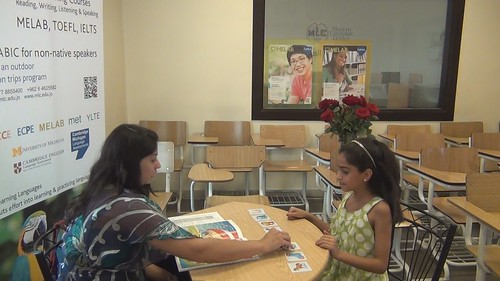Accurately Assessing Student Proficiency
Last Thursday, participants tuned in to #langchat to discuss ways to accurately assess student proficiency. In case you couldn’t join us last week, you can find a summary of Langchatters’ reflections on proficiency assessment below!
Thank you to those who participated in the conversation last week or watched it unfold from the sidelines. We extend a special thanks to moderator Kris (@KrisClimer) for leading another Q&A style #langchat, with help from Sara-Elizabeth (@SECottrell) and Cristy (@msfrenchteach)!
Question 1: What topics and conversation level can a novice sustain?
When conversing with novices, @srtajohnson13 emphasized that “COGNATES are key!!!!!” and encouraged “basic conversation,” characterized by “simple [questions] like ‘How are you?’” and “personal [questions] (origin, occupation, etc.).” @SenoraWienhold also associates personal topics with instruction for novices: “When I think novices, I think ‘all about me’.” @srtajohnson13 agreed, writing, “Me too! The topic of ‘me’ is VERY familiar [for novices],” and @SenoraWienhold pointed out that “high schoolers love to talk about themselves.” Finally, @madamebaker advised instructors to revisit the “ACTFL Novice [Can-Do] Statements” to refamiliarize themselves with appropriate expectations for different levels.
@KrisClimer commented, “We’re all guilty of expecting novices to do too much, and @srtajohnson13 echoed this point, writing, “novices SHOULD be repeating memorized phrases…so hard for me to accept!!”
Question 2: What’s the difference between chunking and creating language?
@tmsaue1 offered a definition of chunking: “Chunks of language are memorized high frequency [combinations] of words.” @mvhsfrancais1 shared a “[French 2] project example [with] chunks that became complex,” with students creating language of their own invention around chunks.
Question 3: What does creating language at the intermediate level look like?
Langchatters described features of intermediate language. @SenoraWienhold wrote, “Intermediates can make more complex sentences over more expanded topics.” @nicola_work commented that intermediate output is also “less planned [and] much more spontaneous.” @SECottrell noted the introduction of “new situations [and] new topics” at the intermediate level, adding that, in contrast to novices, “intermediates can create outside of ‘me, me, me’.”
Once again, participants expressed difficulty in keeping their expectations appropriate for students’ level. @KrisClimer said, “For me, it’s important to read the rubric. I think intermediate is higher than it is” and reminded fellow instructors that it is “important to look at similarities and DIFFERENCES [in expectations] between Novice High and Intermediate Low.” [Refer to the ARTFL Can-Do Benchmarks here: http://www.actfl.org/global_statements]
Question 4: How does vocabulary deepen from novice to intermediate?
@srtajohnson13 observes interest-driven vocabulary exploration at the intermediate level: “For me, they start to explore/create/investigate their own vocabulary that is relevant to their interests.” She added, “I also TEACH them how to find new vocab – sometimes looking it up in dictionary/wordreference.com isn’t enough.” @srtajohnson13 also encourages her students to work with the vocabulary that they have acquired by means of circumlocution: “[I try to] teach them [to] speak using what they already know!” In terms of comprehension, @nicola_work observes intermediate students “understanding new vocabulary more from context.”
Question 5: How does sentence structure change from novice to intermediate?
Participants noted increased sentence complexity at the intermediate level. @srtajohnson13 wrote, “[Intermediate] sentences [include] connecting words/phrases, more detail [and] description,” adding that students begin to expand their explanations: “answers to questions start to include ‘because………’ with [an] explanation.” @nicola_work also commented on more sophisticated sentence structure: “[There are] more complex sentences with some subordination, coordination.” @srtajohnson13 further commented that ideas become more fleshed out as “[intermediate] sentences start to become paragraphs.”
Conclusion
Participants emphasized the importance of making topics personal for students at the novice level. They described the increased complexity of intermediate proficiency in terms of sentence structure and vocabulary. Throughout, they emphasized the importance of creating realistic and level-appropriate expectations for students.
Thank you
Thank you again to Kris (@alenord), Cristy (@msfrenchteach) and Sara-Elizabeth (@SECottrell) for moderating another Q&A style #langchat! To view the entire conversation, you can access the full transcript on our tweet archive.
If you have any comments or questions that you would like to share, do not hesitate to do so. If you haven’t done so already, we invite you to share your thoughts on #langchat’s Q&A format, as well! Finally, send us your ideas for future #langchats so that our weekly discussions can become as relevant and inclusive as possible!






No Comments